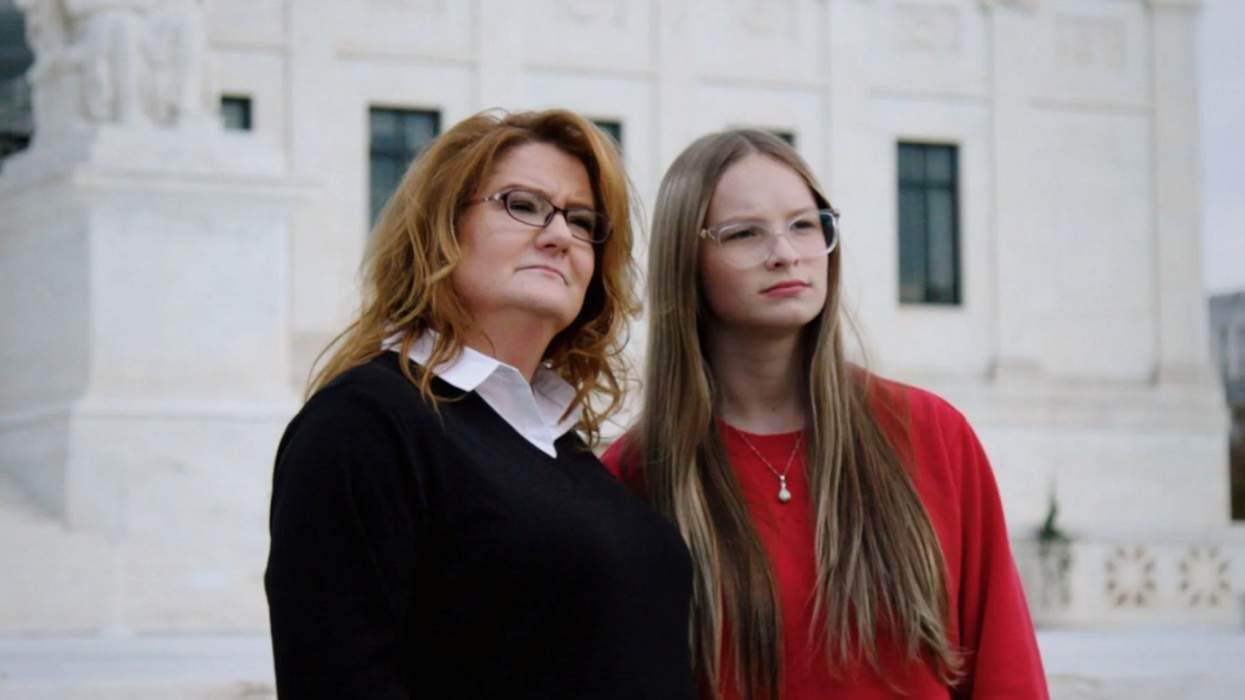A visceral response happens when viewers see characters that reflect their lives on screen for the first time. Clarity blossoms from a place of former uncertainty, and at long last we feel we have a place in the world. For out bisexual filmmaker and video journalist Shayna Maci Warner, it's a feeling she'll never forget. And one she hopes to arouse in future generations.
A former managing editor of OutWrite, UCLA's source for queer news and content, Warner is a recipient one of GLAAD's 2018 Rising Stars Grants, given to LGBTQ youth working to accelerate queer acceptance online, for her series The First Time I Saw Myself. The series chronicles the tangible impacts of LGBTQ representation, which the rising star has experienced firsthand.
"I grew up in a very small town," Warner says of Novato, Calif., a city north of San Francisco, where the population first hit 50,000 in 2006. "There wasn't any visibility for queer people, for trans people, at all, and bisexuality had never been introduced to me."
All that changed, Warner says, when she saw Sara Ramirez play Dr. Callie Torres on ABC's Grey's Anatomy. Torres's coming-out arc displayed her attraction to more than one gender and showed her first relationship with a woman.
"Suddenly there was this amazing character going through the same thing I was about to go through," explains Warner, who refers to that period as the great light bulb moment in her life and a catalyst toward creating her own stories about the LGBTQ experience.
Warner had been making home movies since seventh grade, but after that pivotal moment, she says, "I realized that I could actually be a part of something like Grey's Anatomy, which brought so much clarity to me," she explains. "And so, I started writing as much as I could, and watching as many movies as I could, and television, and just kind of realizing that it was what I thought was the most impactful way of communicating."
That search led to Warner's series, The First Time I Saw Myself, which came to fruition while she was working on video essays at UCLA. She'd focused on queer topics before, including a documentary she made about the shadow cast at Los Angeles's Nuart Theater screenings of The Rocky Horror Picture Show. But once she started interviewing people about their queer identities, she realized there was much more to say.
She began filming LGBTQ people speaking about the first time they saw truthful depictions on screen.
"It's definitely an individualized experience," Warner says now. "I caught a lot of notes of catharsis and kind of eureka moments, light bulb moments, and especially -- this is a recurring theme -- somebody feeling like something makes sense, and not feeling so alone in an identity." She quickly adds, "sometimes it's complex because these characters are not perfect depictions. Sometimes there are really problematic elements, but it's a start. No matter what it is, it's a start."
Warner, who will be going to New York University in the fall to pursue a master's degree in cinema studies, says her main objective as a filmmaker is to create trans visibility, and more space for trans creators to tell their own stories.
"We have so many incredible trans actors and writers and directors, and they seem to be at a lower level of popularity right now," Warner says. "But they're coming up through the ranks and people need to realize they are the people who can authentically tell their story." She also believes Hollywood needs to trust "the individuality of people's stories," explaining, "People want to see new stories. I think that belief that we all want the same kind of story because it's easy and we want to enjoy ourselves and have mindless laughs -- that needs to be kicked out of there."
Warner's message for audiences who still hunger for richer narratives that reflect their own story: "Your identity has value. There are so many people who love you, because you are queer and because you are trans, and want you to be in their family."
Now, Warner says, she is "looking to focus on queer representations across American television and digital media, and the evolution to where we are now, with shows like Vida and Pose and [web series] like Dragula."
The sheer visibility of LGBTQ folks is now far greater than it was 20 years ago, but that doesn't mean the need is any less.
"It's my dream to continue producing and writing and documenting as much vital queer [experiences] as I possibly can," she says, because "people connect with their unique stories, and it makes us feel less alone."
Photography by Luke Fontana
Photo assistant Dillon Matthew
Glam Calvin Scott
Glam Blondie for Exclusive Artists, using MAC Cosmetics
Stylist Aisha Rae
Assistant stylist Angel Cross















Charlie Kirk DID say stoning gay people was the 'perfect law' — and these other heinous quotes
These are some of his worst comments about LGBTQ+ people made by Charlie Kirk.